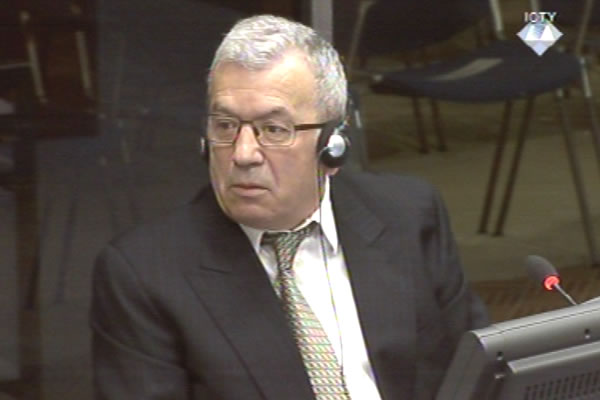Home
BRDJANIN SORRY HE COULD NOT BE TRIED ON ‘NEW STANDARDS’
In his testimony in Radovan Karadzic’s defense, former president of the Crisis Staff of the Autonomous Region of Krajina Radoslav Brdjanin said that ‘in light of the latest standards’ applied by the Tribunal in the past two years he in fact didn’t know why he had ever been found guilty. In Brdjanin’s view, only local kingpins and direct perpetrators were responsible for the crimes, not their superiors; this is exactly what some of the Tribunal’s recent judgments seem to imply
 Radoslav Brdjanin, witness at the Radovan Karadzic trial
Radoslav Brdjanin, witness at the Radovan Karadzic trial In his evidence before the Tribunal, Radoslav Brdjanin, former president of the Crisis Staff of the Autonomous Region of Krajina, strove to deny that the accused Radovan Karadzic was responsible for the crimes in that part of BH. At the same time, Brdjanin had to tread carefully, lest he should corroborate the findings from his judgment (he was sentenced to 30 years in prison by the Tribunal). Brdjanin was convicted of persecution, deportation, forcible transfer, murder, torture and destruction of residential and religious buildings in Bosnian Krajina. This is only a fraction of the charges Karadzic is charged with.
The accused read out the summary of Brdjanin’s statement to the defense. Brdjanin said that the non-Serbs from Krajina were not expelled: they left ‘voluntarily’ to areas where they felt safer. In Brdjanin’s words, that was why his Crisis Staff established a ‘removals agency’ to ‘help’ those who wanted to leave. Brdjanin denied that Karadzic had any ties with the Krajina authorities or indeed that there were any ties between the regional and local crisis staffs. Brdjanin thus implied that the crimes in the field could only be linked with the low-ranking municipal leadership.
At the beginning of the cross-examination, the prosecutor confronted Brdjanin with the findings in his judgment in which he was convicted of the crimes in 13 Krajina municipalities. ‘You know this better than I do, but in light of the Tribunal’s latest standards, I really don’t know why I was convicted’, Brdjanin replied. Although he didn’t specify, Brdjanin obviously referred to the so-called ‘Meron’s standards’ established in the past two years; apparently he feels he would have been able to get away with it had they been applied. All Brdjanin would have to prove is that his actions hadn’t been ‘specifically directed’ to the commission of the crimes. Brdjanin also complained about his defense team, who were ‘not able to prove’ his innocence. He was ‘nothing but window-dressing in my own case’ because he was not allowed to say anything, Brdjanin explained. He agreed with the presiding judge that he had personally waived his right to give evidence in his own defense.
Noting that there was a strong hierarchy in the Bosnian Serb authorities from Karadzic and the rest of the top leadership down to the municipalities, the prosecutor showed a series of documents which indicate that the municipal authorities implemented the decisions of the ARK Crisis Staff and that Brdjanin worked on Karadzic’s orders. The witness claimed that the relation of the municipal authorities and his Crisis Staff was ‘like in a marriage –at the beginning it was good and later it got weaker’. This prompted the prosecutor to tender into evidence documents showing that the ‘marital bliss’ continued for months after the ARK Crisis Staff was established. On the other hand, the prosecutor put it to the witness that he had been in constant contact with the accused. On one occasion the accused told the witness in a telephone conversation not to call him so often because ‘I am not your nanny’. Denying that the Crisis Staff implemented the plans of the Pale leadership, Brdjanin claimed it was impossible simply because Serbs were a ‘nation prone to improvisation, not plans’.
During the war the witness, known for his ‘inflammatory speeches’, didn’t hesitate to openly insult non-Serbs in BH. Brdjanin’s judgment found that Brdjanin thus ‘promoted a climate’ in which the crimes were committed. A video recording of a rally in Banja Luka in August 1994 was played today in court. In the footage Brdjanin says the Serbs now had an obligation ‘for the next one hundred years to wipe off their shoes the non-Christian scum who have sullied this country of ours’. Brdjanin favored a proposal to put up a barbed wire fence around the main square in Banja Luka to prevent ‘the Serbs’ enemies’ from entering it. The witness explained that this and similar statements were made in an atmosphere of fear and with emotions running high. Today, with a cooler head, he admitted that what he had said ‘doesn’t do me credit’. Brdjanin said that he was misunderstood because he failed to stress that he didn’t mean all the Muslims and Croats, but their leaderships only. In the re-examination, Karadzic tried to suggest that when he spoke of ‘non-Christians’ Brdjanin in fact had in mind the Serb communists and atheists, but was forced to abandon this line of questioning when the judges warned him about asking leading questions.
At the end of the testimony, presiding judge Kwon thanked the witness telling him that he was now ‘free to go’.‘That means I can go home, you’ve just said I am free?’ Brdjanin asked jokingly. If the trend of early releases granted to the prisoners after two thirds of their sentences continues, Brdjanin’s joke will became reality in a little over five years.Linked Reports
- Case : Karadzic
- 2013-11-15 WAS KARADZIC ‘AGGRESSIVE’ OR ‘VIOLENT’?
- 2013-11-14 WHY DID KARADZIC TOLERATE BRDJANIN’S ‘IDIOTIC’ ACTIONS?
- 2013-11-13 KRAJISNIK’S DEMOCRATIC ASSEMBLY
- 2013-11-19 KRAJISNIK IS ‘NOT CREDIBLE’ AS WITNESS
- 2013-11-20 MILOSEVIC’S ‘NASTY WORDS’ ABOUT KARADZIC AND KRAJISNIK
- 2013-11-21 KARADZIC AND KRAJISNIK FOR EU IN BALKANS
